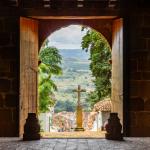We can do things in a new and innovative way. In the language of the Second Vatican Council, we could call this “reading the signs of the times.” Too often, we might stay in the past and do things as in past days. However, we have an opportunity to play chess instead of checkers.
When George Weigel looked for a title for his biography of Pope John Paul II, he settled on Witness to Hope. This man who had come of age during Nazi and then Soviet occupation lived always as a witness to hope. He sought to carry forward the work of Christ, making his pontificate Christ-centered from the publication of his first encyclical, Redemptor Hominis. Christ entered the world to be a witness to the truth and St. John Paul II did the same through standing up consistently for universal human dignity in the face of totalitarian communist regimes of the East and heartless applications of capitalism in the West. He was someone who learned to read the signs of the times. While they were playing checkers, he learned to play chess.
His ability to read “signs of the times” is a callback to the Pastoral Constitution Gaudium et Spes. Rather than simply plodding along, we need to learn to play chess.
To carry out such a task, the Church has always had the duty of scrutinizing the signs of the times and of interpreting them in the light of the Gospel. Thus, in language intelligible to each generation, she can respond to the perennial questions which men ask about this present life and the life to come, and about the relationship of the one to the other. We must therefore recognize and understand the world in which we live, its explanations, its longings, and its often dramatic characteristics (Gaudium et Spes, 4).
What is this great task? God asks the Church
to carry forward the work of Christ under the lead of the befriending Spirit. And Christ entered this world to give witness to the truth, to rescue and not to sit in judgment, to serve and not to be served (Gaudium et Spes, 3).
This calls for ingenuity and reading the signs of the times.

Signs of the Times
Today’s Gospel describes the end times in dramatic fashion. “The sun will be darkened, and the moon will not give its light” (Mk. 13:24). We can focus too much on external signs. If we just for the sun to darken and the moon to go dim, we passively wait for them to determine our lives. Perhaps we lose our sense of agency and risk losing our free will.
Reading the signs of the times is very different from consulting astrology or a fortune-teller, both practices condemned by the Church. Why is it so different? Fortune-telling and astrology seek to have a magical control over world and personal events. In our own context, we may risk more the prospect of materialistic determinism. We are tempted to think that by studying scientific propositions we can predict perfectly what is going to happen. Part of the freedom that God gives us is precisely free will. We cannot control everything in our future, and that is where we have to trust God. But there are many things that are within our control and here is where we must give our best effort.
When Jesus talks about learning the lesson from the fig tree, he tells us to recognize the obstacles placed by the enemy and to trust infinitely in God’s mercy and grace. To read the signs of the times, we need to know the situation, be anchored in hope, and work like our lives depend on it.
Know the Situation
Since the ways of the world oppose the ways of Jesus, we seem to live secretly in enemy-occupied territory.
Enemy-occupied territory–that is what this world is. Christianity is the story of how the rightful king has landed, you might say landed in disguise and is calling us all to take part in a great campaign of sabotage (C.S. Lewis, Mere Christianity).
If we realize that as Christians we are living in enemy-occupied territory, we will no longer be surprised that the “world hates us” (c.f. Jn. 15:18). Jesus promised as much to his followers.
What are you contributing? We need men and women in all the fields of science and culture who comprehend the Church’s message and are willing to translate it into the language of their peers. This is the work of learning to play chess instead of checkers. Pope John Paul II was able to speak directly to the hearts of artists and scientists, because he knew them and respected them deeply. However, much work remains undone.
Anchored in Hope
We resist pressures of this world because the hope we find in Christ buoys us. Anchored in hope, we face difficult situations courageously,
We need the greater and lesser hopes that keep us going day by day. But these are not enough without the great hope, which must surpass everything else. This great hope can only be God, who encompasses the whole of reality and who can bestow upon us what we, by ourselves, cannot attain. The fact that it comes to us as a gift is actually part of hope. God is the foundation of hope: not any god, but the God who has a human face and who has loved us to the end, each one of us and humanity in its entirety (Pope Benedict XVI, Spe Salvi, 31).
When we come to recognize God’s place in our lives, we begin to read the signs of the times more accurately. We understand that God intervenes in our history, while giving our freedom its full place. This means that we must take responsibility for our actions and rejoice in the possibility to follow God out of love, and not out of fear or conditioning. Reading the signs of the times means learning how to engage in our society from the point of view of the Gospel and serving others as witnesses of true Christian charity. When we remain faithful to the Gospel message and help the people of our time understand it, we are playing chess.
Work Like your Life Depends on it
Once we recognize the situation and hope fills our hearts, we have to get to work. The world will not change unless we engage it enthusiastically and effectively. Pope John Paul II lived through the epochal change of the rise of Soviet Communism and the toppling of the various satellite states and rise of democracy in 1991. The future saint focused on celebrating the Jubilee of the year 2000. This is part of reading the signs of the times. We are not called to be desperate or discouraged, but hopeful and courageous. What are you going to do to build up God’s Kingdom and prepare for the Second Coming of Jesus?
Subscribe to the newsletter to never miss an article.














